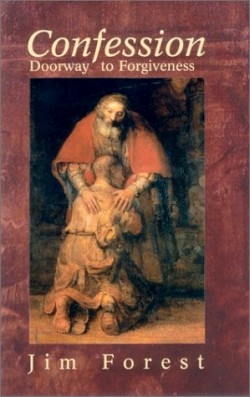Confession
Doorway to Forgiveness
“Go now, this minute, stand in the crossroads, bow down, and first kiss the earth you’ve defiled, then bow to the whole world, on all four sides, and say aloud to everyone: ‘I have killed!’ Then God will send you life again. Will you go? Will you go?” The speaker is young Sonya Marmeladovna in Fyodor Dostoevsky’s 1866 novel Crime and Punishment. She’s insisting to student Rodya Raskolnikov—who’s just confessed to murdering an elderly woman and her simple-minded sister—that he give himself up. She tells him that his only hope is to confess to authorities. It isn’t until one year into his eight-year sentence that Raskolnikov realizes the full and horrendous extent of his crime and is finally repentant.
Using examples as diverse as the classic works of the late nineteenth-century Russian author, as well as the Indiana Jones movies created by Steven Spielberg and the folksy Midwestern wisdom of Garrison Keillor, the author gives insight into the once common and traditional practice of confession—the sacrament of repentance and reconciliation. Forest, who has written numerous books on nonviolence, reconciliation, and religion in Russian, is a New Jersey native first baptized Episcopalian. At nineteen, he joined the Catholic Church; nearly thirty years later he was received into the Orthodox Church. A resident of the Netherlands since 1977, Forest has long been active in the international peace movement. He writes that the purpose of this book is threefold: to help revive confession where it has been abandoned or neglected, to help the reader prepare a better confession, and to help those who hear confessions better serve as Christ’s witness. Forest expresses sadness that the act of confession has become lost to many—he observes that in one church he visited, the confessionals now serve as closets, housing cleaning supplies, Mass booklets, and candles.
In friendly, first-person narrative, Forest leads the reader through chapters such as “Three-Letter Word.” Referring to the word sin, he explains that in Hebrew and Greek, it literally means straying off the path, getting lost, or missing the mark. Forest believes that confession is more than disclosure of sin: it also involves praise of God and profession of faith. People are social and verbal beings, he notes, and that’s why the Christian ritual takes on a communal characteristic. “Confession in the church differs from confession in your living room in the same way that getting married in church differs from simply living together. The communal aspect of the event tends to safeguard it, solidify it, and call everyone to account—those doing the ritual, and those witnessing it.” While exploring a brief history of the topic, Forest details how, as Christianity itself spread to Ireland, it took on a distinctly Celtic look.
He recalls Saint Columba—a young prince who became a monk—who went into self-exile to Iona in the Inner Hebrides off the coast of western Scotland. This remote island later became a principal center of Christian activity. In northwest Europe, Iona was regarded as second only to Jerusalem as a blessed place to await the resurrection.
Forest wants the reader to consider how six stories he relates from the Bible throw light on the triumvirate of repentance, confession, and forgiveness. He dissects the stories, which include the Parable of the Prodigal Son, the raising of Lazarus from the dead, and the woman caught in the act of adultery: “And as they continued to ask him, he stood up and said to them, ‘Let him who is without sin among you be the first to throw a stone at her.’” Forest asks: “Which of us is not a sinner? And if such a spotless person were present, would he or she wish to take part in the killing of another?”
The Ten Commandments and the Beatitudes—blessings taught by Christ near the Galilean lakeside town of Capernaum—are two resources Forest encourages for use in self-examination prior to confession. Along with each commandment and beatitude, Forest lists his own comments and questions for the reader to consider. He also does this with the fourth-century prayer written by Saint Ephraim the Syrian. For example, regarding “idle talk” he asks, “Have I lied or gossiped? Have I maligned or slandered others? Have I become addicted to noise because I cannot bear silence?” Forest advises readers to find a confessor, recites biblical texts that might be helpful, and culls experiences from friends and colleagues.
While most readers have not committed sins as grave as Raskolnikov’s, all readers—no matter their religious inclination or lack thereof—can take away from this book something worthwhile with respect to their own lives.
Reviewed by
Robin Farrell Edmunds
Disclosure: This article is not an endorsement, but a review. The publisher of this book provided free copies of the book to have their book reviewed by a professional reviewer. No fee was paid by the publisher for this review. Foreword Reviews only recommends books that we love. Foreword Magazine, Inc. is disclosing this in accordance with the Federal Trade Commission’s 16 CFR, Part 255.

